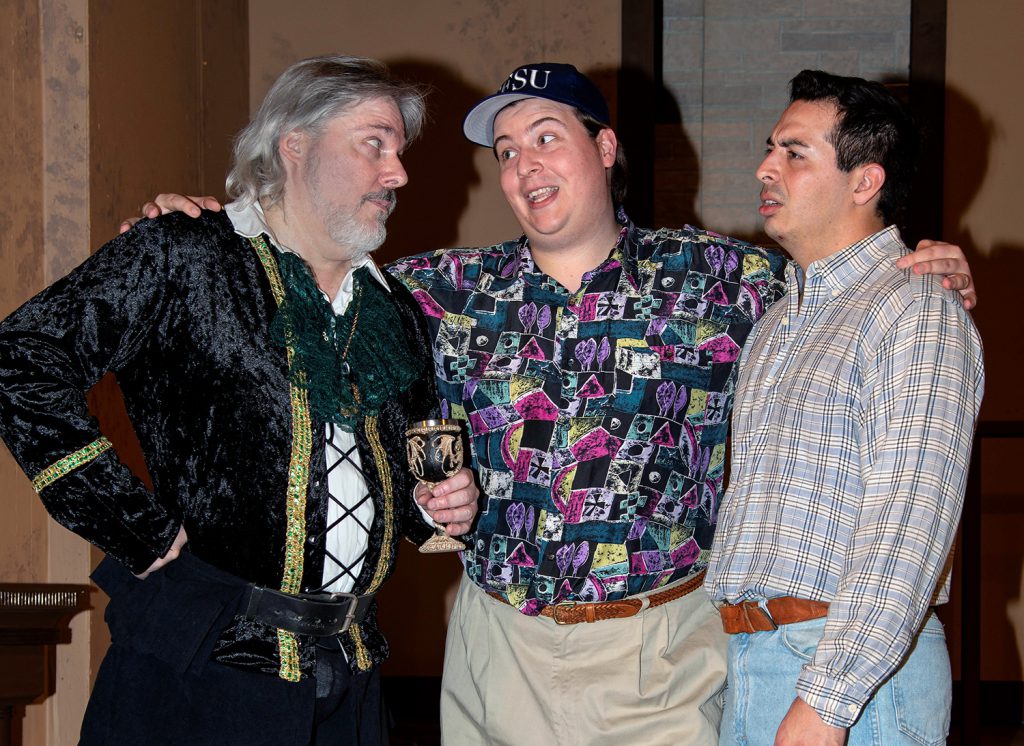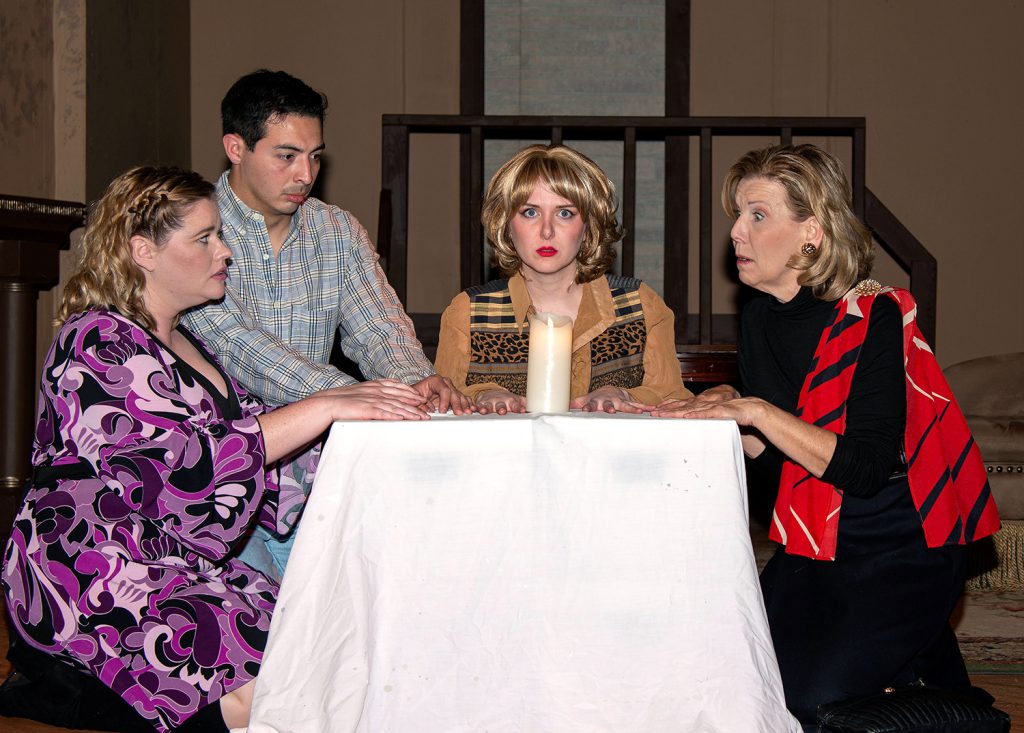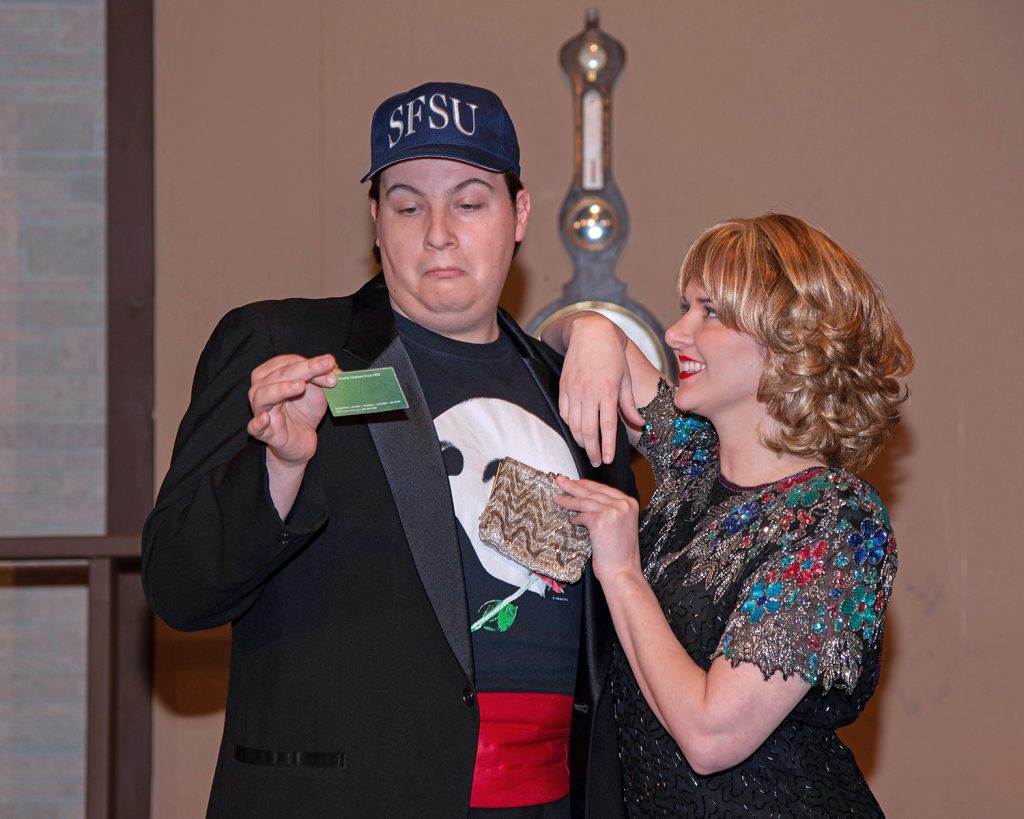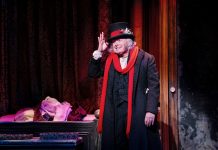
By Eric Marchese | Special to the NB Indy
Seeing how show-biz folks behave when not before an audience can be a hoot. Paul Rudnick’s “I Hate Hamlet” positions us to laugh at both theater and television, two performance modes where actors are center-stage – so it stands to reason it oughtta be fun.
As we see in Newport Theatre Arts Center’s new production, directed by Floyd Harden, the 1991 comedically contrasts the mindset, personality and work ethic of television actor Andrew Rally (Dave Rodriguez) with those traits of John Barrymore (Eldon Callaway), legendary stage star and a matinee idol of the silent film era.
The plot of Shakespeare’s greatest tragedy is kick-started by the appearance of the ghost of the Danish prince’s murdered father, which shows Rudnick’s cleverness in using an apparition – Barrymore’s – as a launching point for his story.
In the best sitcom tradition, the way the spirit of Barrymore enters Andy’s life is a contrivance. While trying his hand doing Shakespeare in the Park, his first taste of New York theater, the Los Angeles actor needs an apartment, so real estate agent Felicia (Victoria Leigh Serra) convinces him to rent the loft once occupied by Barrymore himself.
As fate would have it, the young actor is about to tackle the monumental role of Hamlet, a character immortalized on stage by Barrymore in the early 1920s. Thus, Rudnick sets in motion a dynamic wherein a TV actor afraid of live theater, and terrified of the historic burden of playing Hamlet, is being encouraged, prodded and egged on by one of the greatest Hamlets ever (albeit his ghost).

A hilariously bad thespian, Andrew is riddled with self-doubt, repeatedly saying “I’m no actor” and “I’m no Barrymore.” Indeed, watching the character undergo an absurd ritual of method acting techniques just to prepare for reciting the “To Be or Not To Be” speech is as comically painful for us – and for the spirit of “the Great Profile” (Barrymore’s nickname).
Playwright Rudnick skillfully serves up well-justified ridicule of those who worship at the alter of the boob tube, capably implying that TV actors are awful and nowhere near good enough or talented enough to be able to handle the demands of live theater – and so, by virtue of that fact, they’re unworthy of being part of that exalted art form.
Yet the script fails to clearly define main character Andrew or to provide us a clearly visible character arc for him. At some points, Andrew is reverent toward TV and disdainful of theater, while at others, he praises theater and is dismissive of TV.
Among other flaws, the script doesn’t even plausibly attribute the presence of Barrymore’s spirit to an impromptu séance. What’s more, we see the ghost well before Felicia tries to summon Barrymore – just one example of the script failing to capitalize on potentially comedy-laden scenarios.
Because it’s safe to say that playwright Rudnick is unable to turn his situation-oriented story into comedic gold, NTAC’s production can’t be faulted. Director Harden has a decent cast thwarted at nearly every turn by the script.
While Rodriguez misses the mark in portraying Andrew’s comic desperation, he does capture Andrew’s hilarious ignorance. One example is how he questions Barrymore’s use of Elizabethan English (standard in Shakespeare’s time), saying the actor routinely “overacts” and resorts to “hamming it up” with a style that’s too “big” and too “over the top.”
By contrast, Callaway is simply superb. He brilliantly avoids overacting in bringing the role of this legendary actor to life and, just as expertly, ensures that we don’t see Barrymore overacting or laying it on too thick. He makes the task of essaying Barrymore look effortless, exactly what’s needed for anyone in the role.

What’s more, Callaway shows us that even while Barrymore defends his alcohol-fueled binges, the star was filled with self-loathing not only for having become a lush, but for abandoning the stage in favor of Hollywood.
Andrew and Barrymore aside, the supporting characters aren’t so much characters as collections of traits. Deirdre (Kayla Agnew) is an airhead with even less acting talent than boyfriend Andrew. Lillian (Mary Price Moore) is a chain-smoking German actress who had a decades-earlier fling with Barrymore. Felicia (Serra) is a ditsy chatterbox, and Andrew’s Hollywood actor pal Gary (Cody Aaron Hanify) is a chuckleheaded buffoon.
By surrounding Andrew with kooky lightweights, Rudnick paints Andrew as seemingly the story’s only level-headed person. We have to ask why the playwright didn’t make these characters comically eccentric yet more grounded in reality, which would have opened up more comedic possibilities.
Barrymore and Andrew aside, the showiest role is that of Gary, a boneheaded plebe made comically obnoxious by Hanify. Gary has never heard of Barrymore and is clueless of his legendary status.
For her part, Agnew’s Deirdre bubbles over with enthusiasm for Shakespeare and for all things theater – and also for life itself, and whatever magic, mystery and romance it brings.
“I Hate Hamlet” does deliver a fascinating factoid: That the Barrymore family’s original surname was Blyth. John’s actor dad Herbert Blyth created the name Maurice Barrymore for himself, and his son, having been born John Sidney Blyth, similarly changed his name for the stage.
In all fairness, a few one-liners do shine through the flawed “I Hate Hamlet” script, and anyone seeing this show should get a kick out of Barrymore and Andrew’s comedic swordfight, easily the evening’s liveliest scene. These elements and Callaway’s spectacular embodiment of Barrymore are enough to justify a visit to the charming little hilltop venue.
Newport Theatre Arts Center, 2501 Cliff Drive, Newport Beach. Through March 6. Running time (including intermission): 2 hours, 25 minutes. Tickets: $20. Ticket purchase/information: (949) 631-0288 or www.ntaconline.com.
Eric Marchese has written about numerous subjects for various publications since the mid-1980s but is best known for his coverage of Orange County theater.




